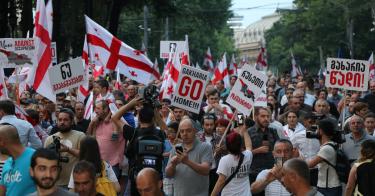Over the past few weeks protests in Tbilisi, Georgia, have stirred up a huge amount of political turmoil. Perhaps from up close this turmoil appears negative due to the alarming number of protests, but in the grand scheme of things, it is a sign that Georgia’s democracy is thriving.
The protests began in mid-June but then took a major turn on June 20, when Russian Member of Parliament Sergei Gavrilov addressed the Interparliamentary Assembly on Orthodoxy from the Georgian parliamentary speaker’s seat. This sparked much upheaval, since Georgia’s current relations with Russia remain tense. After all, Russia still occupies about 20 percent of Georgia’s territory. The protest was quite violent on both sides, with riot police firing rubber bullets, tear gas, and water cannons to fend off the crowds, and protestors pushing against the police, throwing bottles, and snatching shields and helmets from various police officers. About 240 people were injured in the end.
Georgian Speaker of the Parliament Irakli Kobakhidze resigned the next day.
Interior Minister Giorgi Gakharia, who oversees the police force, could be next to resign because the Georgian people have been calling for his resignation over the unnecessarily extreme use of force that the police have been using during the protests. Many accuse Gakharia of poorly handling the situation.
The main protest is currently centered around Russia’s occupation, but other protests have popped up in Tbilisi. A week prior to the June 20 protest, Georgia’s LGBT community was planning a pride march, but then they postponed the march because they were afraid of potential violence. (In 2013, for example, dozens of LGBT protestors were beaten by priests and far-right activists, so their fears were absolutely legitimate.) After the June 20 protest occurred, they joined others in calling for Gakharia’s resignation and condemning Russia’s occupation. Pro-Russian activists have come up against the Russian occupation protestors.
Amid these protests, other protestors were calling for an early switch to a proportional electoral system for 2020. As a result, the Georgian Dream party announced electoral changes on June 24 in line with their demands. Fortunately, the LGBT pride march was eventually held peacefully amid a heavy security presence.
Although the protests have largely been peaceful, Russia has found a way to integrate them into its hybrid warfare campaign and use them as a tool to drive divisions in Georgian society.
Georgian democracy has come a long way over the past three decades. In the few years following the collapse of the Soviet Union, democracy was off to a rocky start. Georgia’s first president in the country’s new era of independence, Zviad Gamsakhurdia, was deposed by his people less than a year after coming to power. This was because he was a despot and inhibited any form of democracy from being achieved. Georgia’s next president, Eduard Shevardnadze, faced charges of cronyism and government corruption. Additionally, he had to cope with a failing Georgian economy. Eduard Shevardnadze resigned in 2003, after being suspected of rigging that year’s parliamentary elections.
Soon after, Georgia experienced the “Rose Revolution,” which was comprised of peaceful protestors carrying roses and Mikheil Saakashvili was elected as president in January 2004. Saakashvili greatly decreased governmental corruption, jumpstarted exponential economic growth, and nurtured Georgia’s fledgling democracy.
Further, the economic growth that Saakashvili fostered helped Georgia won it “most improved” status in The Heritage Foundation’s Index of Economic Freedom. From 1996 to 2019, Georgia jumped from number 124 in terms of economic freedom, to number sixteen.
When Saakashvili’s opposition United National Movement party lost in the 2012 parliamentary elections, the Georgian Dream party came into power, and it has been the majority party since. Over the past seven years, the party has continued to fight government corruption in Georgia and aid in economic reform. Of course, it is important to note that with each president in office, there have been bumps along the road.
Overall, Georgia has come a long way in enacting reforms, simplifying taxes, and opening markets, and its democratic progress will likely only continue. However, one must remember that democratization is a long road, and popular protests are part of the process. Western observers should not be discouraged by them.
At this point it appears that Georgia’s citizens will get their wish and Gakharia will resign. The protests have been in full swing for nearly a month, and they seem to be chugging along. The Georgian people are passionate about their country and want to see it head in the right direction. History and current events prove that it already is.
This piece originally appeared in The National Interest



